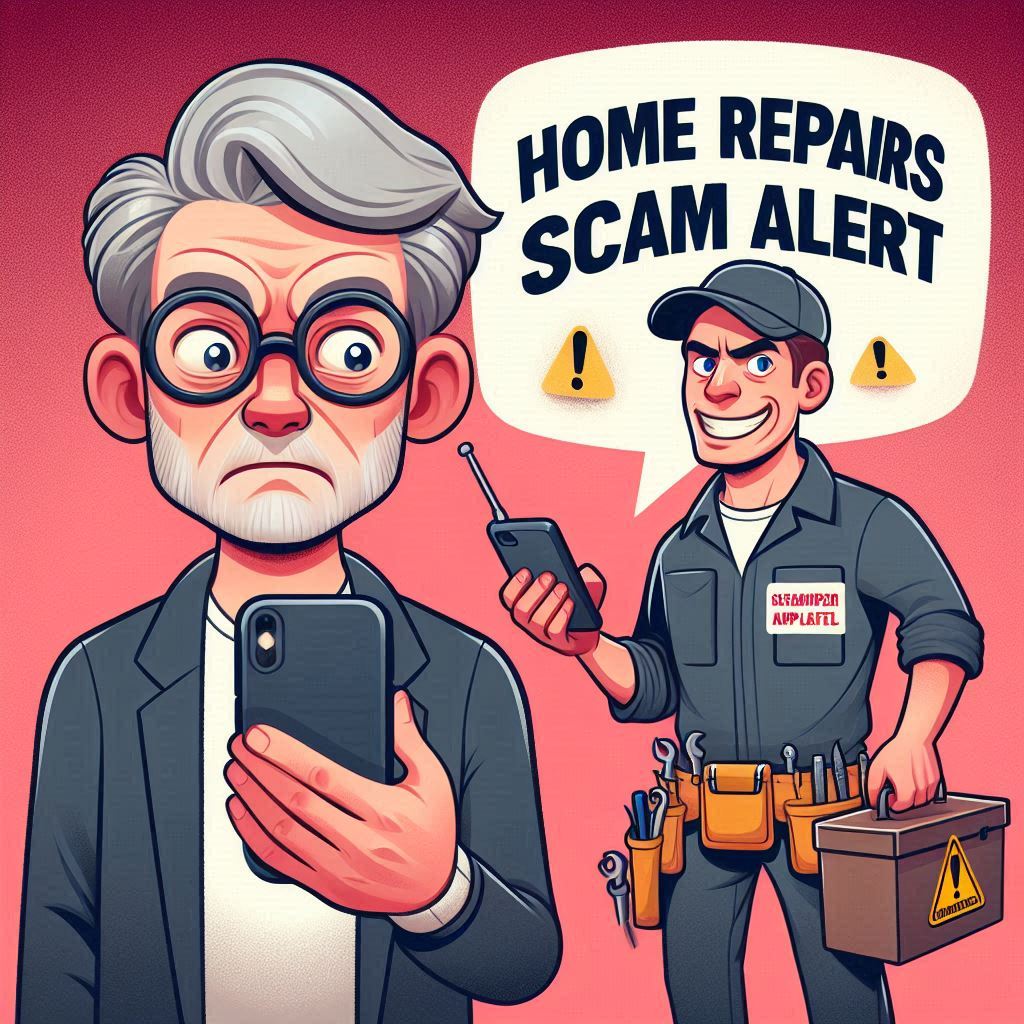
What Are Home Repair Scams?
Home repair scams are a form of fraud where dishonest individuals or companies deceive homeowners into paying for unnecessary or shoddy work. The concern with these scams is significant; they not only cost homeowners financially but also undermine the sense of safety and trust within their own homes.
Persuasive Tactics
Scammers in the home repair industry are skilled at using persuasive tactics to convince homeowners of urgent problems that need immediate attention. The fear of more extensive damage or the lure of a ‘too good to be true’ deal can lead someone to make a quick decision they might later regret.
The Scams Rely On Lack of Knowledge
These scams can range across various services, from roofing repairs after a storm, to foundational work, to quick-fix plumbing jobs. Each type relies on the homeowner’s lack of knowledge in the specific area and the illusion of time pressure.
Social Engineering
Many homeowners wonder why intelligent, well-intentioned people fall for these scams. Scammers use social engineering tactics to manipulate the basic human tendency to trust others. By presenting themselves as helpful and knowledgeable professionals, they can often disarm skepticism and take advantage of that trust.
Identifying Home Repair Scams: Key Red Flags
When discussing home repair scams, it’s vital to know the warning signs that scream FRAUD. Victims often recount similar red flags before the scam unfolds. One standout warning sign is when a contractor appears uninvited at your door, claiming to have noticed an issue with your property. This cold-call approach is a classic ploy that should raise your eyebrows.
Cold Call & Extreme Pressure
Another red flag surfaces when professionals exert extreme pressure. It can come in the form of a one-day discount or a claim that an immediate repair is imperative for safety. These tactics aim to prevent you from thinking things through or seeking a second opinion. Always remember, genuine professionals want you to make informed decisions.
High-Pressure Sales Tactics
Expect to encounter high-pressure sales tactics frequently used in home repair scams. Some contractors may insist on cash payments or large deposits before starting any work. Others may rush you into signing a contract full of complex, confusing language designed to mislead.
Check Credentials!!!
Lastly, watch out for deceitful credentials. Scammers might flaunt bogus licenses, insurance documents, or even fake references. It’s crucial to ask for certifications and to verify their legitimacy with the appropriate licensing bodies and former clients. If they hesitate or provide unclear answers, consider it a MAJOR RED FLAG.
Protecting Yourself from Home Repair Fraud
It is vital it to take proactive steps to shield yourself from home repair scams. The process isn’t complicated, but it does require diligence. From my experience, thorough vetting is the cornerstone of scam prevention. Always start by checking the credentials of anyone you’re considering for hire. It’s not rude; it’s smart. Verify their licensing, insurance, and bond status with the state’s regulatory bodies.
Read Reviews and Check References
Looking deeper than the surface is also key, which means reading reviews and checking references. I focus on patterns rather than one-off comments. A single negative review might not be a deal-breaker, but a consistent trend of issues certainly raises a red flag. Contact previous clients if possible, as scammers rarely leave a trail of satisfied customers.
Trust Your Instincts
When something feels off, trust your instincts. Don’t procrastinate on digging deeper or asking tough questions. And if you suspect a scam, act immediately. Start by halting any ongoing work and refrain from further payments. Get in touch with local authorities or consumer protection agencies to share your concerns and seek advice on the next steps.
Document Everything
Documenting every interaction, quote, and transaction is crucial. In a potential scam situation, this documentation serves as your ammunition should legal action become necessary. Keep a detailed log with dates, times, names, and descriptions of conversations, and save all written communications.
Lower Your Risk
No industry is immune to fraudsters, but with the right precautions, you can significantly lower your risk of falling prey to a home repair scam. Remember, legitimate professionals won’t shy away from scrutiny. They expect and respect it.
Legal Recourse and Victim Support Post-Scam
If you’ve fallen victim to a home repair scam, I understand it can be a stressful and confusing time. In this section, I will guide you through the steps you need to take to seek justice and get the support you need to move past this challenging experience.
Take Pictures
First, it’s crucial to document everything. Keep a detailed record of all interactions, payments, and agreements you had with the service provider. This information is vital for any legal action you may pursue. Take pictures if applicable.
Explore Legal Options
Then, explore your legal options. Depending on the severity and nature of the scam, you might choose to file a civil lawsuit or contact law enforcement to press criminal charges. Local consumer protection agencies can also be a valuable ally in navigating legal pathways.
Seek Support
Don’t overlook the importance of seeking support. This can be a trying time emotionally and financially. Organizations that specialize in scam recovery can provide counseling, financial advice, and assistance in getting your affairs back in order.
Final Thoughts
By sharing your story, you can empower others to avoid similar pitfalls. Participating in educational campaigns, or even a simple conversation with neighbors, can help raise awareness and protect your community from home repair scams.
Did you enjoy this post? Do you want to know when the next post comes out? Consider subscribing. I only send update emails once a week, usually on Friday. Try it out. You can unsubscribe at any time.
